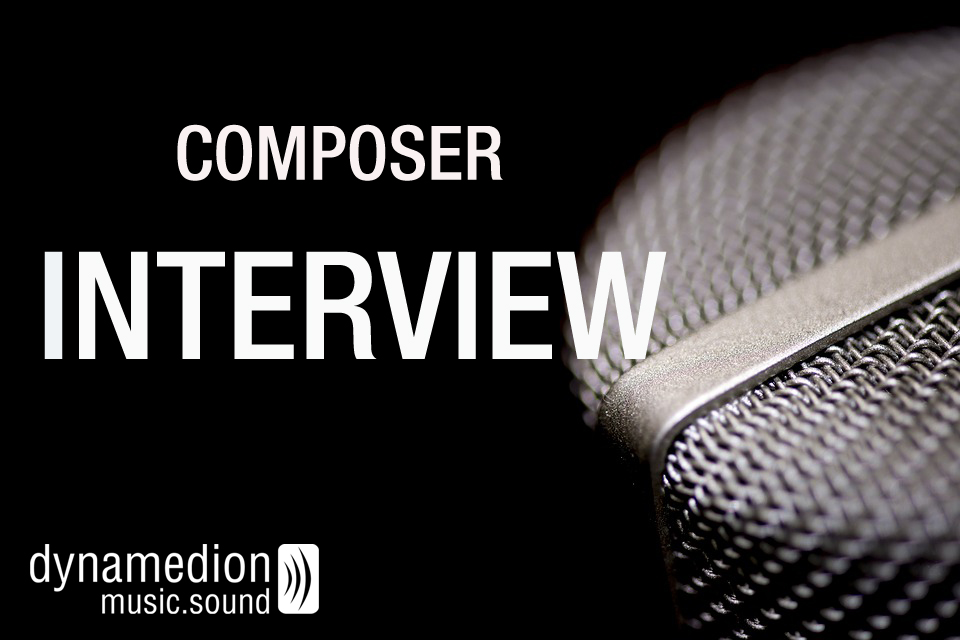Get to know the composers behind Dynamedion. We are kicking off this series with Tilman Sillescu, our lead composer who told us some insights about his work and how to handle every task.

You might have read our articles over at SONUSCORE on how to deal with the blank page syndrome, the process of creative creation and how to deal with client’s feedback. These were distilled versions of the interviews we held with 5 of our most renowned composers to cover these three essential topics for working composers. Thinking about your questions and worries, we concluded that sharing the individual interviews could help you even more on your path to becoming the best composer you are capable of becoming, which is why we decided to publish the insights our composers shared for you here on our blog.
The longstanding experience our composers have has taught them to overcome hurdles in their daily business that every composer knows. Given time they learned not to be too uptight about these things. While reading the personal, direct and uncut interview you will come to get to know our composers behind Dynamedion and gain valuable insights into their workflow and creative process.
For starters and seasoned veterans alike this interview series will hold ideas and insights that can help you take your music to the next level. Our composers share useful tips and tricks how to manage every task. Now, enjoy reading the interview with Tilman’s personal and honest thoughts.

Tilman Sillescu
(Total War: Warhammer, Mortal Combat, Ryse: Son of Rome, Crysis2)
“I will never do that well-known ‘messing around with notes’ that the famous film composer John Barry criticized on some modern composers. My compositions are based on a single, compelling musical idea that I elaborate on with great care.”
TO BE CREATIVE ON POINT IS NOT ALWAYS EASY. EVERYBODY KNOWS THE SITUATION WHEN YOU ARE SITTING IN FRONT OF A WHITE SHEET OF PAPER TRYING TO FIND THE RIGHT BEGINNING AND THE RIGHT IDEA. HAVE YOU EVER EXPERIENCED YOURSELF IN SUCH A SITUATION AND HOW DO YOU MANAGE TO FIND THE BEGINNING?
“While composing game music, I like to be inspired by pictures and I ask my client to send me some video captures or screenshots of the game. This helps me to create a kind of first musical idea in my head. If I don’t get an idea in spite of pictures, I sometimes switch off the computer and try to mentally plunge into the situation. This works really well: the more I am able to dive emotionally into the game, the sooner I get an idea.
If everything goes wrong and I haven’t any idea, I sometimes let myself be inspired by movie soundtracks which have a similar setting. But you have to be careful to not “use” too much reference in your own composition – you should only get a first impression how to manage the task. I am glad that this is not necessary most of the time, usually ideas come to my mind easily. It’s a process that isn’t easy to describe, it happens automatically.”
IF YOU GOT THE CHANCE TO GIVE YOUR 15 YEARS YOUNGER SELF AN ADVICE – WHAT WOULD YOU SAY?
“I would say: ‘You are on the right way, boy – relax and try to enjoy it.'”
HOW DO YOU MANAGE TO FIND THE RIGHT WORKFLOW? DO YOU HAVE ANY RITUALS OR METHODS THAT HELP YOU TO GET INTO THE SPIRIT OF A THEME?
“When I have an idea I start working on it on the computer and try to make a sketch that is meaningful. If there is enough time, I take a break from the idea and check out if I still like the composition on the next day. If yes, then I start to elaborate on it carefully and send a first rough version to the audio director or developer.”
HOW CAN SAMPLE LIBRARIES SUPPORT YOU IN YOUR DAILY WORK? SURE, THEY ARE HELPFUL FOR TIME CRITICAL PROJECTS, BUT ARE THERE ANY OTHER BENEFITS?
“There are a lot of fantastic libraries on the market and with the help of these you can program/ install the music very vividly – that inspires me again and again. Mostly I create a layout first and in the next step my music will be recorded live – then it comes “to life”. But I have to admit that I also use libraries to pimp my live sounds afterwards, as it is done in many Hollywood studios. There are some frequencies mainly in the bass sections which aren’t easy to catch in live recordings. But for me it is still important to have as many live performances from musicians recorded as possible in my compositions.”
HOW DO YOU RATE THE QUALITY OF SAMPLE LIBRARIES IN COMPARISON TO LIVE RECORDINGS?
“The sound quality of top-libraries is often very high. Especially the live orchestral tracks are recorded in great sounding halls and scoring stages. What most libraries haven’t achieved, in spite of legato-tools, is the soul that a musician or an orchestra breathes into the composition by playing a melody or a musical phrase live. The emotion and musical bows can only be created if you don’t simply play separate notes, but rather whole, coherent phrases. This will always be a compromise, I’m afraid;).”
WHAT DOES YOUR FIRST CONTACT WITH A NEW LIBRARY LOOK LIKE? WHAT IS IMPORTANT TO YOU AND WHAT IS NECESSARY FOR YOU WHILE TESTING THE NEW PRODUCT?
“I attach great importance to the sound quality and also to the intuitive playability of the instrument. I must have the opportunity to create inspired music with a library. If it is too complex and complicated to use, it stops being fun and thus it doesn’t inspire me anymore. Some big libraries, even though I own them, have fallen out of my template, because when I use them I am programming myself to death ;).”
HOW DO YOU JUDGE YOUR OWN COMPOSITION? WHICH FACTORS PLAY A ROLE?
“The most important thing is the basic idea that must be inspired on every level. I never want to do that well-known “messing around with notes” that the famous film composer John Barry criticized with some modern composers. My compositions are mostly based on a single, compelling musical idea that I elaborate on very carefully. I have to convince myself of the strength of my idea. It is never good to simply record more and more material without reflecting upon the musical core to try to conceal the weakness of the basic idea. This procedure would create random tracks which you hardly can call a composition.”
IS IT POSSIBLE THAT YOU RECOGNIZE THAT YOU FOLLOW THE WRONG DIRECTION WHILE COMPOSING? HOW DO YOU REACT?
“It may be hard to believe, but usually my very first idea is the best. Sometimes I test something different, but in the end I often would return to my first idea. In some situations, you have to relinquish your idea heavy-heartedly as it doesn’t fit the scene. In this case the best thing is to start with a completely new template and to set up a new tempo and meter. If you try to tinker on your old idea – you often will not take a step forward. So for me it is better to throw my old idea to the wind and start with a new one.”
HOW DO YOU HANDLE CUSTOMER’S CRITIC IF HE/SHE HAS GOT ANOTHER VIEW ON THE RESULT AS YOU HAVE?
“I take the developer wishes extremely seriously. I regard him/her as a partner while composing as he/she is a “part of the team”;). I often hear from other composers that their customers are “annoying” and “have no idea” and that they “make life awkward” for composers. I see this differently. I’ve been doing my job for over 15 years now and nearly all of our customers are really capable and had clear visions of their projects and together we achieved great results. There were situations in which I was caught in my own idea and I have bristled internally to create something different. But often I have learned that it is better to try something different to achieve the best result. Customers often are right, they keep the big picture in mind, while composers are professionally blinkered – that has been my experience dead honest. I really like customer’s feedback as it motivates me even more.”
•
Tilman Sillescu
Hope you enjoyed reading the interview. Stay tuned for some more interviews with our award-winning composers, get to know them and profit from their experience. We try our best to support you in all concerns.
See you soon, your Dynamedion-Team
